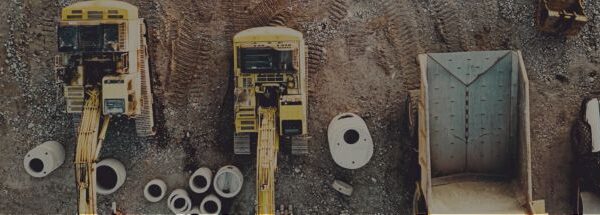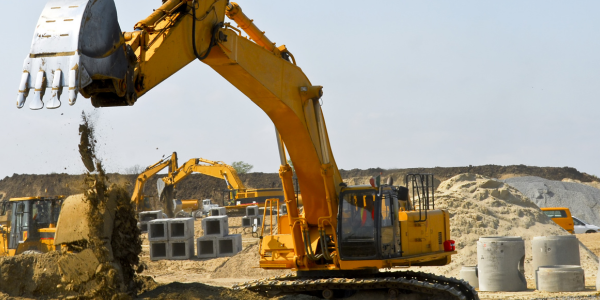
As the enterprise construction industry progresses, the integration of technology, especially in equipment management, takes center stage. One of the most notable advancements in this domain is the adoption of GPS tracking for high-value construction equipment and sophisticated logistics software.
- Technology Integration: As construction evolves, GPS tracking and logistics software become crucial for managing high-value equipment.
- Advanced GPS Capabilities: Modern GPS tracking extends beyond location monitoring, providing utilization metrics that help balance equipment wear and manage lifespan.
- Key GPS Metrics: GPS systems now track operational hours, idle time, fuel efficiency, and offer service reminders, geofencing, and job costing features for more precise management.
- Benefits of Enhanced Allocation and Security: Real-time data ensures efficient equipment allocation and heightened security against theft, with systems alerting to unauthorized use.
- Proactive Maintenance and Costing: GPS tracking shifts maintenance from reactive to predictive, using data to anticipate service needs and more accurately track job costs for billing.
GPS Tracking: Beyond Basic Location Monitoring
GPS tracking, at its inception, was largely a tool to pinpoint the geographical position of an asset. However, its utility in the modern construction enterprise has expanded significantly:
- Construction Equipment Utilization Metrics: Modern GPS systems provide more than just location data. They offer insights into equipment usage to better understand which machines are overworked and which ones are underutilized. Such metrics substantially prolong the lifespan of equipment by ensuring balanced wear and tear.
Essential Metrics for Optimizing Construction Equipment Management
- Operational Hours: Track actual working hours to gauge productivity and plan maintenance.
- Idle Time: Monitor equipment idle time to identify inefficiencies.
- Fuel Efficiency: Analyze fuel consumption versus operational hours for efficiency insights.
- Service Reminders: Alerts for timely maintenance based on hours or intervals.
- Geofencing Alerts: Notifications for equipment entering or leaving predefined areas.
- Speed Alerts: Monitor equipment speed to ensure safety standards.
- Time on Site: Measure equipment time spent on job sites for accurate billing.
- Job Costing: Allocate costs accurately with equipment usage data.
- Equipment Scheduling: Optimize equipment allocation across projects.
- Carbon Footprint: Calculate equipment’s carbon footprint from fuel consumption.
- Enhanced Equipment Allocation: Efficient allocation of machinery, based on real-time location and usage data, significantly reduces downtime and expedite project completion. This precision ensures that assets are dispatched where they’re needed most, optimizing workflow and productivity.
- Security and Theft Deterrence: With the increasing cost of construction equipment, security has never been more paramount. GPS tracking serves as both a deterrent for potential thieves and a means of rapid recovery if theft occurs. Advanced systems send notifications of unauthorized use, adding an additional layer of security.
Maintenance: Proactive Rather than Reactive
Historically, equipment maintenance in the construction industry followed a reactive model. However, with the integration of modern GPS tracking:
- Predictive Maintenance: Modern systems schedule maintenance based on actual equipment usage. By monitoring metrics such as engine runtimes, fuel consumption, and more, maintenance shifts from a reactive approach to a proactive one.
- Data-driven Insights: With the wealth of data generated by GPS trackers, smart companies anticipate potential mechanical issues, making informed decisions on when to service machinery. This not only prevents costly downtimes but also extends the equipment’s operational life.
Costing and Billing Precision
In the enterprise construction arena, accurate job costing often makes the difference between profit and loss. Here’s where GPS tracking excels:
- Operational Hour Tracking: By recording the exact operational hours of machinery on a project, companies ensure that their billing reflects true equipment usage. This granularity aids in more transparent evaluations of a project’s profitability.
- Fuel Consumption Analysis: Advanced GPS systems provide insights into fuel consumption patterns, aiding in precise job costing. Moreover, these insights lead to more efficient operations and potential tax benefits.
Sustainability in Construction
Sustainability is no longer just a buzzword, even in industries as robust as construction:
- Emission Reduction: By monitoring and subsequently reducing unnecessary idling times, companies significantly cut down on fuel wastage and greenhouse gas emissions.
- Efficient Transit: For mobile equipment, GPS assists in plotting the most efficient transit routes, saving both fuel and time. This step, albeit seemingly minor, contributes significantly to a company’s sustainability initiatives.
Introducing the Next Step: Logistics Solution
In the rapidly evolving landscape of construction technology, it’s crucial for businesses to stay ahead of the curve. We are thrilled to announce the upcoming launch of the Logistics Solution, coming to RentalResult and EquipFlows in the Spring of 2024.
The Logistics Solution will be a game-changer, offering real-time transportation visibility that complements and amplifies the capabilities of GPS tracking. With this new addition:
- Projects will see heightened punctuality in deliveries: Ensure tools and equipment are always where they’re needed most. Every hour of reduced downtime translates to thousands of dollars in savings.
- Dispatch will be sharper and more accurate than ever: With real-time ETAs, plan routes and communicate changes swiftly and efficiently. Assign trucks in the most optimal way to maintain your project’s timelines.
- Idle equipment will become a concern of the past: With smart notifications, dispatchers move equipment efficiently from one jobsite to the next, potentially reducing total project costs by 5-15%.
- Workflow will become seamless: Bid farewell to third-party operations, expensive APIs, and the errors they bring. This all-in-one system is designed to boost reliability, speed up processes, and unlock never-before-seen efficiencies.
In essence, the Logistics Solution will revolutionize equipment management, allowing construction companies to further reduce costs, enhance efficiency, and optimize workflows.
Conclusion
The enterprise construction industry, known for its scale and complexity, is at the cusp of a technological revolution. The integration of advanced GPS tracking systems and logistics software promises a future of increased efficiency, precision, and profitability. While the tools and methodologies may be modern, the underlying principles remain unchanged: delivering projects efficiently, on time, and within budget. As the industry moves forward, embracing these technological advancements will be key to staying competitive and ensuring long-term success.
For more information on Logistics Solution Transportation Management System or for more information on how you can optimize your fleet management with Logistics Solution contact us to get a personalized demo.



